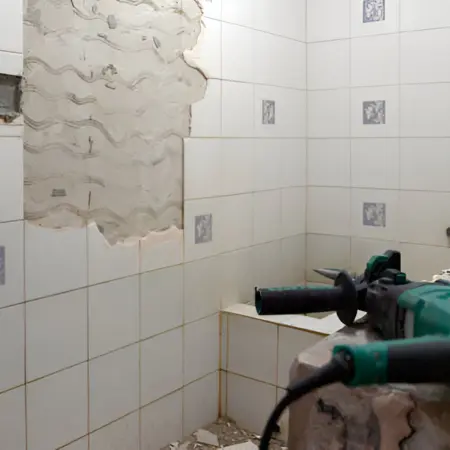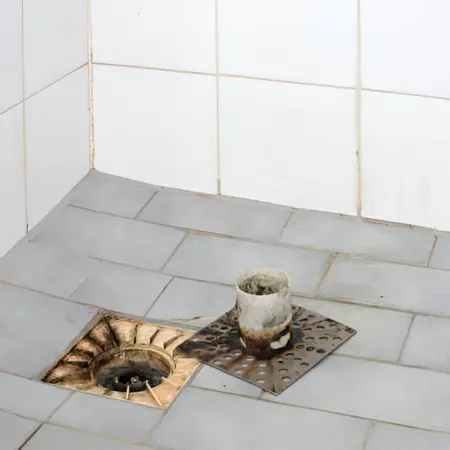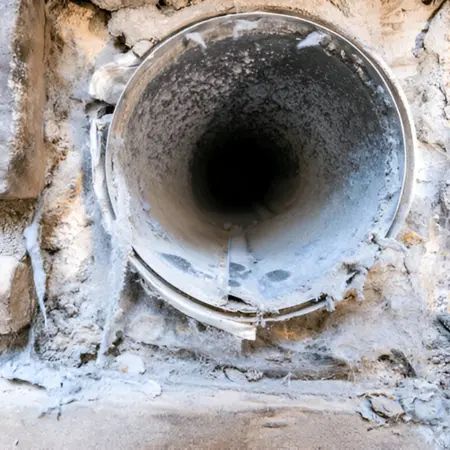Did you know that tile grout dust can cause plumbing problems?
While often overlooked, this fine dust can build up in your pipes and lead to stubborn clogs.
Knowing how grout dust harms your pipes can help you avoid expensive repairs.
Here’s how to protect your pipes from this hidden criminal!
Key Takeaways
- Grout dust can mix with water, forming a sticky substance that clogs your pipes.
- Hardened grout dust can lead to slow drainage, gurgling sounds, and unpleasant odors.
- Grout dust buildup in main pipes can cause serious blockages and expensive repairs.
- Seal off drains with plastic sheets before starting grout work to protect plumbing.
- Avoid washing grout dust down drains; vacuum or sweep it up instead.
- Slow drainage, gurgling sounds, and odors are signs of grout dust clogs in your pipes.
- If DIY methods don’t work, call a professional plumber to remove grout dust blockages safely.
How Tile Grout Dust Can Cause Clogs
Tile grout dust might seem harmless, but it can cause big problems for your plumbing.
When you work with tile grout, fine dust particles are often released into the air.
If this dust mixes with water, it forms a sticky, cement-like substance.
This mixture can get washed down the drain without you even realizing it.
Over time, this sticky substance can harden inside the pipes, making it much harder to clear.

Risks Of Hardened Grout In Drains
Once grout dust hardens in your pipes, it can cause serious blockages.
Sinks and floor drains drain slowly or stop working altogether.
If the grout builds up in the main pipes, it can lead to bigger blockages requiring expensive repairs.
Preventing grout dust from entering your plumbing can save you from these costly problems.
Preventing Grout Dust From Entering Your Plumbing
Here’s how to prevent grout dust from getting into your plumbing and causing problems.
1. Preparation And Precautions
Before you start grouting (filling), make sure to seal off your drains.
You can cover them with plastic sheets, tape, or special drain covers.
This keeps grout dust from going down the drain and causing blockages in your pipes.
Taking this simple step helps protect your plumbing while you work.
2. Clean-Up Techniques
After grouting, don’t wash the dust down the sink and drain.
Instead, sweep or vacuum up the grout dust.
Avoid rinsing your tools over sinks or near drains, as this can send dust into your plumbing.
By cleaning up carefully, you can prevent grout dust from causing damage to your pipes and drains.
Signs Of Grout Dust Clogs
Grout dust can cause blockages in your pipes, and there are a few signs to watch out for.
1. Slow Drainage
If water takes longer than usual to drain from your sink, shower, or floor drain, it might be a sign of a clog.
Grout dust can slowly build up in the pipes, slowing down the flow of water.

2. Gurgling Sounds
If you hear strange gurgling sounds from the drain, it could mean air is trapped in the pipes due to a blockage.
Grout dust can cause pipes to get partially blocked, leading to this noise.
3. Unpleasant Odors
A buildup of grout dust can cause bad smells.
As the grout dust collects and hardens, it can trap food and other debris.
This buildup can cause unpleasant odors to come from your drains.
4. Water Backing Up
One of the most obvious signs of a clog is water backing into your sink, shower, or floor drain.
There may be a blockage if you notice water rising instead of draining.
Grout dust could have formed a thick enough clog to stop the flow completely.
Steps To Remove Grout Dust Clogs
If grout dust is clogging your pipes, there are ways to fix it.
Here’s how to remove grout dust clogs from your plumbing.

1. DIY Methods (If Clog Is Minor)
If the clog is small and the water drains slowly, you can try fixing it yourself.
First, you can use a wet-dry vacuum to remove the grout dust from the drain.
This can help remove some dust particles and clear up the blockage.
Try a natural solution like baking soda and vinegar if that doesn’t work.
Pour baking soda down the drain, followed by vinegar.
Let it sit for a few minutes, then flush with hot water.
Another option is to use bacteria-based drain cleaners.
These cleaners break down organic material in the pipes without causing any damage.
2. When To Call A Professional
If your DIY efforts don’t clear the clog or the water is still backing up, it may be time to call a plumber.
A professional plumber has the tools and experience to deal with tougher clogs deep in the pipes.
They can safely remove the grout dust buildup from your pipes.
This will ensure your plumbing works properly without causing any damage.
Contact us at OP Plumbing Hub for high-quality services.
Conclusion
This article discusses how tie grout dust can cause clogs.
Preventing grout dust from entering your plumbing has also been discussed.
It can save you from expensive repairs.
Keep your pipes safe by cleaning up carefully and sealing off drains during tile work. Contact us at OP Plumbing Hub for pro advice and expert services.
